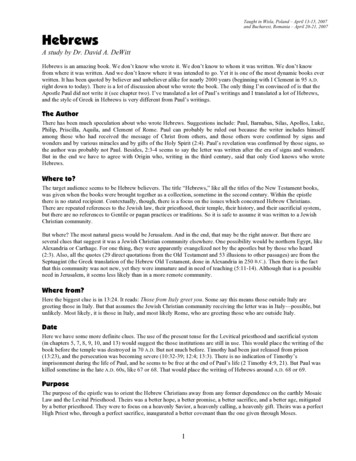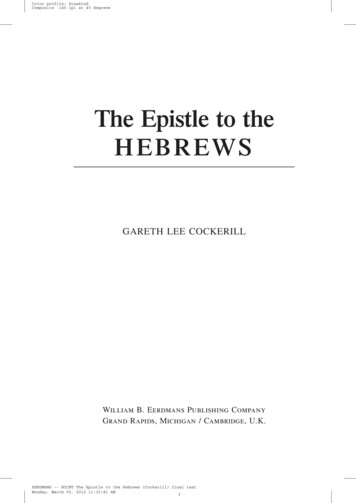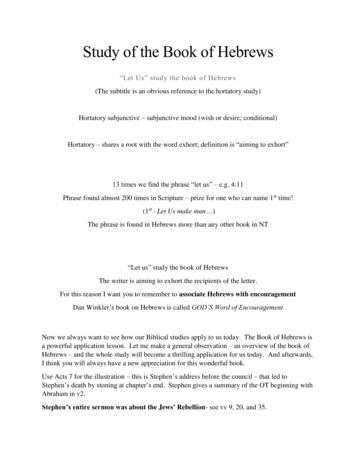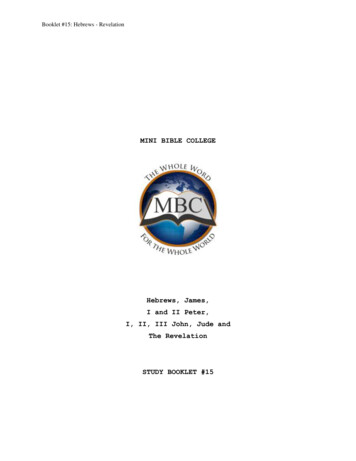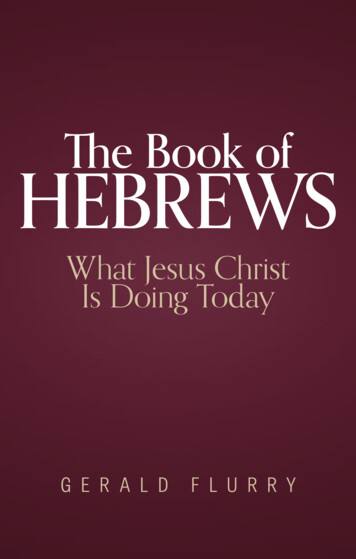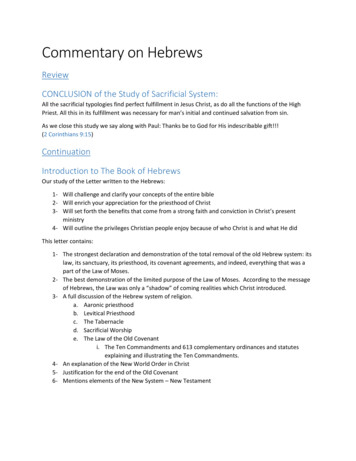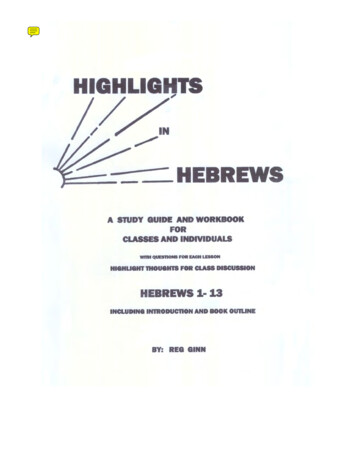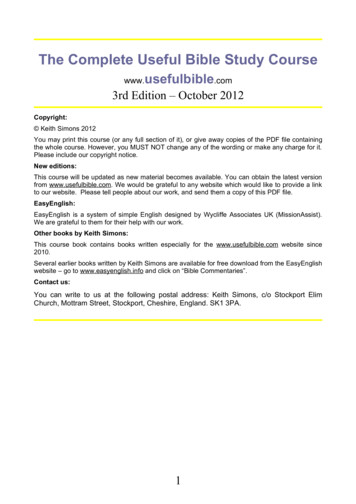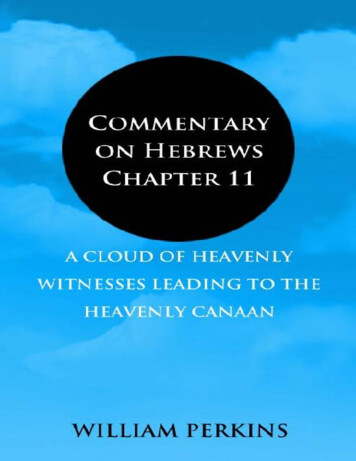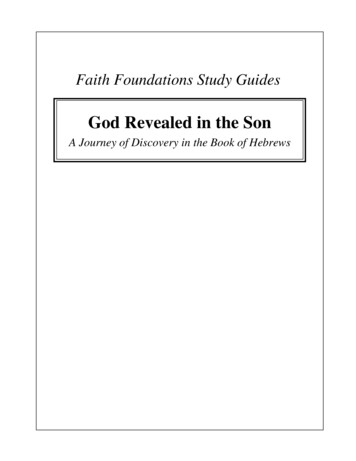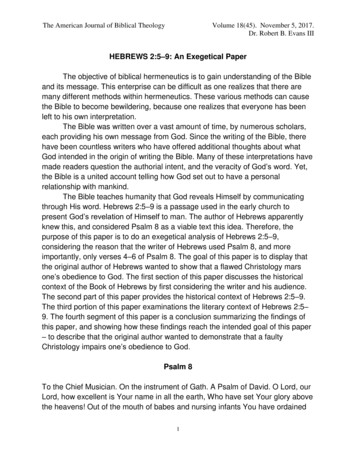
Transcription
The American Journal of Biblical TheologyVolume 18(45). November 5, 2017.Dr. Robert B. Evans IIIHEBREWS 2:5–9: An Exegetical PaperThe objective of biblical hermeneutics is to gain understanding of the Bibleand its message. This enterprise can be difficult as one realizes that there aremany different methods within hermeneutics. These various methods can causethe Bible to become bewildering, because one realizes that everyone has beenleft to his own interpretation.The Bible was written over a vast amount of time, by numerous scholars,each providing his own message from God. Since the writing of the Bible, therehave been countless writers who have offered additional thoughts about whatGod intended in the origin of writing the Bible. Many of these interpretations havemade readers question the authorial intent, and the veracity of God’s word. Yet,the Bible is a united account telling how God set out to have a personalrelationship with mankind.The Bible teaches humanity that God reveals Himself by communicatingthrough His word. Hebrews 2:5–9 is a passage used in the early church topresent God’s revelation of Himself to man. The author of Hebrews apparentlyknew this, and considered Psalm 8 as a viable text this idea. Therefore, thepurpose of this paper is to do an exegetical analysis of Hebrews 2:5–9,considering the reason that the writer of Hebrews used Psalm 8, and moreimportantly, only verses 4–6 of Psalm 8. The goal of this paper is to display thatthe original author of Hebrews wanted to show that a flawed Christology marsone’s obedience to God. The first section of this paper discusses the historicalcontext of the Book of Hebrews by first considering the writer and his audience.The second part of this paper provides the historical context of Hebrews 2:5–9.The third portion of this paper examinations the literary context of Hebrews 2:5–9. The fourth segment of this paper is a conclusion summarizing the findings ofthis paper, and showing how these findings reach the intended goal of this paper– to describe that the original author wanted to demonstrate that a faultyChristology impairs one’s obedience to God.Psalm 8To the Chief Musician. On the instrument of Gath. A Psalm of David. O Lord, ourLord, how excellent is Your name in all the earth, Who have set Your glory abovethe heavens! Out of the mouth of babes and nursing infants You have ordained1
The American Journal of Biblical TheologyVolume 18(45). November 5, 2017.Dr. Robert B. Evans IIIstrength, Because of Your enemies, That You may silence the enemy and theavenger. When I consider Your heavens, the work of Your fingers, the moon andthe stars, which You have ordained, what is man that You are mindful of him,And the son of man that You visit him? For You have made him a little lower thanthe angels, And You have crowned him with glory and honor. You have madehim to have dominion over the works of Your hands; You have put all thingsunder his feet, all sheep and oxen -- Even the beasts of the field, the birds of theair, And the fish of the sea That pass through the paths of the seas. O Lord, ourLord, how excellent is Your name in all the earth!Analysis of Hebrews 2:5–9For He has not put the world to come, of which we speak, in subjection to angels.But one testified in a certain place, saying: “What is man that You are mindful ofhim, or the son of man that You take care of him? You have made him a littlelower than the angels; You have crowned him with glory and honor, and set himover the works of Your hands. You have put all things in subjection under hisfeet.” For in that He put all in subjection under him, He left nothing that is not putunder him. But now we do not yet see all things put under him. But we seeJesus, who was made a little lower than the angels, for the suffering of deathcrowned with glory and honor, that He, by the grace of God, might taste death foreveryone.Historical Context – The Author and His AudienceThe Author: The debate concerning the author of the Book of Hebrews hasbeen discussed, perhaps, since it was written.1 In fact, as time has passed, manyhave avoided delving into the issue because it is near impossible to conclusivelydetermine the original author(s).2 But, it is a vital issue in that it helps set thehistorical context of the Book of Hebrews. However, it is not the intent of thispaper to resolve the issue, but rather acknowledge that the original author had1David L. Allen provides a concise synopsis for the various discussion and debates concerning theauthorship of Hebrews.David L. Allen notes, “Most commentaries on Hebrews of recent vintage do not spend a great deal of timediscussing matter of authorship and recipients. This is understandable in light of the multitude of theories available.”David Allen, Hebrews, The New American Commentary, vol. 35 (Nashville: Broadman and Holman, 2010), 29.22
The American Journal of Biblical TheologyVolume 18(45). November 5, 2017.Dr. Robert B. Evans IIIthe respect of early Christians. This respect allowed him to write the Book ofHebrew, and distribute it so that it was accepted into the Christian Scripture.3Since the writing of the Book of Hebrews there have been numeroussuggestions for the authorship of Hebrews.4 While each of these submissionshave advocates who argue the various cases, the author of this paper contendsthat two seem to have the greatest viability. The two that appear as the mostlikely to have authored the Book of Hebrews are, Paul and Luke.5 The reason forthis hypothesis is that Paul and Luke seem to have the greatest interest in thewelfare of the early church.6 As far as Paul as the author, those that argue forPaul writing the Book of Hebrews state that it is written with the transparency ofunderstanding the Jewish religious tradition.7 On the other hand, those that3F. F. Bruce notes, “Canonicity and authorship are in principle quite distinct, but in the early Christiancenturies, as a practical issue, the canonicity of New Testament books and their apostolic authorship were frequentlyinvolved with each other, and nowhere more so than in relation to this epistle.” F. F. Bruce, Hebrews, The NewInternational Commentary on the New Testament. (Grand Rapids: Eerdmans, 1991), 22. Elsewhere, Brucecomments that “the most authoritative writings available to the church were those which came from his apostles.Among his apostles none was more active in writing than Paul. There were some in Paul’s own day and a few inlater generations, who questioned his right to be called an apostle, but throughout the churches of the Gentiles hisapostleship was generally undoubted – inevitably so, because a number of those churches would not have existedexcept for his apostolic ministry.” Later he states that “the recipients of the letter to the Hebrews no doubt wereacquainted with its author (in that sense they would not have regarded it as an anonymous communication), butsince it does not bear his name, his identity was forgotten after a generation or two, and has never been certainlyrecovered.” F. F. Bruce, The Canon of Scripture (Downers Grove: InterVarsity, 1988), 256–257. D. H. Williamspresents a case showing that authoritative tradition given by the leaders of the church was a large part of defining theearly church. D. H. Williams, Tradition, Scripture, and Interpretation: A Sourcebook of the Ancient Church (GrandRapids: Baker, 2006), 15–32.4Some suggestions for authorship of the Book of Hebrews: Clement, Barnabas, Apollos, Philo, Priscillaand Aquila, Philip, Peter, Silvanus (Silas), Aristion, and Jude.5According to Bruce M. Metzger, most leaders within the early church accepted Paul as the author of theBook of Hebrews. Bruce M. Metzger, The Canon of the New Testament: Its Origin, Development, and Significance(Oxford: Oxford University Press, 1997). David Allen remarks that Eusebius “conjectured that Paul did not prefixhis name to the epistle since the Jews were prejudiced and suspicious of him.” Allen, Hebrews, 30–31. Origen didnot accept Hebrews as coming from the hand of Paul; but, he did recognize its apostolic authority. Craig D. Allert, AHigh View of Scripture? The Authority of the Bible and the Formation of the New Testament Canon (Grand Rapids:Baker, 2007) 53–54. However, there are some that contend that Origen thought that the Book of Hebrews wasPauline, but that someone else wrote the letter because of stylistic matters.6The writer of this paper acknowledges that Hebrews could have been written after Paul and Luke. Allencomments, “The view that Luke could have helped Paul write Hebrews was popular in the nineteenth century, but itfell into disrepute in the twentieth century due to the increasing weight of the anti-Pauline hypothesis and thecombination of two converging positions: (1) the Luke-Acts was written late in the first century and not necessarilyby Luke the traveling companion of Paul; and (2) that Hebrews is likewise to be dated after-AD 70.” Allen,Hebrews, 47. However, it seems plausible that Paul and Luke could have worked on Hebrews before they wereseparated, seeing the disruption taking place within the early church, and Luke finished the work later. However,since all are silent about the matter, no one can know definitively.3
The American Journal of Biblical TheologyVolume 18(45). November 5, 2017.Dr. Robert B. Evans IIIreason that Luke wrote the Book of Hebrews maintain that the literary styleappears to resemble Luke-Acts.8 Since Paul and Luke were co-laborers andcompanions in their journeys, it seems plausible that they shared thoughts withone another about God’s work. And, as they shared these thoughts together theywere reminded of the hard work, and the need to encourage followers to continuethat work. This could lead one to conclude that Paul and Luke wrote Hebrews.Additionally, Leon Morris helps strengthen the argument that Paul and Lukecollaborated to pen Hebrews. He states, “The earliest reference to authorship isa statement of Clement of Alexandria that Paul wrote it in Hebrew and that Luketranslated the work into Greek.”9 One contends that Paul provided Luke withJewish ideology and clarification, and Luke took this information and edited it.Even though Donald Guthrie does not support the idea, he does note that theauthor was “a man who has pondered long on the Christian approach to the OldTestament.”10 In other words, the author was a man who had worked out hissalvation, and wanted others to follow (Phil 2:12). The main concern of the writerof Hebrews seemed to have had was that Christians need a strong Christocentricworldview.11 As a consequence, he wanted his audience to realize that a warpedChristology harmed his walk and faith with God.The Reader: The debate concerning the authorship of the Book ofHebrews is only part of the issue that has been discussed. The other factor thatSteven Ger comments, “The fact that his Old Testament quotations are exclusively drawn from theSeptuagint lead many to believe that the author is a Hellenistic (Greek) Jew born outside the land of Israel amongthe Jewish diaspora of the Roman Empire.” Steven Ger, The Book of Hebrews: Christ is Greater, Twenty-FirstCentury Biblical Commentary Series (Chattanooga: AMG Publishers, 2009), 1–2.7Allen maintains, “An examination of the New Testament literature reveals that the writings of Luke andHebrews alone approach the standard of Classical Greek style. The similarity in vocabulary and style was noted asearly as the second century. Hebrews shares 53 words that occur elsewhere in the NT only in Luke-Acts, asignificant number. In fact, two-thirds of the total vocabulary of Hebrews occur in Luke-Acts.” Allen, Hebrews, 49.89Leon Morris, Hebrews, The Expositor’s Bible Commentary, vol 12 (Grand Rapids: Zondervan, 1981), 6.See, Eusebius, Ecclesiastical History, 6:14.2.10Donald Guthrie, Hebrews, Tyndale New Testament Commentaries, vol. 15 (Downers Grove:InterVarsity, 1990), 21. Guthrie remarks, “The anonymity of the text is an immediate difficulty for Paulineauthorship, since nowhere is there any suggestion that Paul would have written anonymously.” Guthrie, Hebrews,19.11Ray C. Stedman comments, “Wherever the readers lived it is clear that they were largely secondgeneration Christians; their first leaders had already passed away (13:7). They had professed Christ for some time(5:12) and had once shown great evidences of sturdy faith (10:32 –34). But when the letter was written they hadreached a state of discouragement and spiritual lethargy. Some had given up meeting with other believers (10:25);many found increasing opposition to their faith in Jesus among their Jewish families and friends, while they alsofaced sharpening hostility from Gentile authorities and citizens.” Ray C. Steadman, Hebrews, The IVP NewTestament Commentary Series vol. 15 (Downers Grove: InterVarsity, 1992), 12–13.4
The American Journal of Biblical TheologyVolume 18(45). November 5, 2017.Dr. Robert B. Evans IIIhas been deliberated is the recipients of the Book of Hebrews. The variouspossibilities are: Jewish (Messianic and Non-Christian) Community in general,Jewish Christians, non-Jewish Christians, Gentile Christians, Hellenistic Jews, orthe Christians in Rome or Jerusalem. Ger contends that with the absence of anyexplicit hearers, it is more difficult to identify the recipients for the Book ofHebrews, than the authors.12 Yet, if Paul and Luke, as Clement of Alexandriacontends, were co-authors of the Book of Hebrews; then, they could havereached their intended audience with the message as it is found within Hebrewswithout identifying themselves. One major part of that message was toencourage them not to forsake the assembling of themselves or their faith.The Limit of the Passage – Hebrews 2:5–9The limitation of this passage, as found within this paper, is confined toHebrews 2:5–9. The reason for the restriction is that the original author only usedthree verses from Psalm 8 to convey a part of his message (Hebrews 2:5–9).The other part of Hebrews 2:5–9 applies some insight for how the verses fromPsalm 8 are intended to be utilized. Yet, the verses as found in Psalm 8:4–6 andHebrews 2:6–8 seem to desire to convey a thought – man should realize that heis important to God. A paradigm for this can be seen in Hebrews 2:6 whichstates, “What is man that You are mindful of him Or the son of man that You takecare (episkepte) of him?”13 Hermann Beyer observes that the understanding ofGod’s “gracious visitation to men and nations” is a concept that is realized fromthe Old Testament and is passed on into the New Testament.14 The writer of12Ger, The Book of Hebrews: Christ is Greater, 11–21.Hermann W. Beyer states, “The term episkepomai has a religious content in the LXX only when God isthe Subject of the action. . . . It denotes an unchanging attitude on God’s part. The word episkeptomai actualizes thisattitude. It is mostly used where we have the rendering ‘to visit.’ It combines the various senses of ‘to visit, to lookupon, to investigate, to inspect, to test, to be concerned about, to care for,’ in description of the act in which the Lordin a special incursion into the course of life of individuals or of a people, mostly Israel, makes known to them Hiswill either in judgment or in grace. It is worth noting that this sense does not occur in secular Greek but only in thecontext of the OT history of salvation, from which it passes into the NT. This visitation takes place when God drawsnear to His people in its sin and distress, and shows Himself to be the Lord of history. It may entail the judgmentexecuted by Him. But it may also consist in an act of mercy. The point is that He manifestly enters history.”Hermann W. Beyer, “episkeptomai,” in Theological Dictionary of the New Testament, vol. 2. (Grand Rapids:Eerdmans, 1991), 602.1314Ibid., 605.5
The American Journal of Biblical TheologyVolume 18(45). November 5, 2017.Dr. Robert B. Evans IIIHebrews reminds man that in the beginning, God made man in His image to ruleover creation. However, man’s disobedience forfeited that right. Therefore, Godsent His Son to redeem and rectify the issue that man’s sin caused. God and HisSon are to be glorified for the work that they accomplished; for the work thatJesus Christ achieved places Him over all things (Psalm 110). A failure to applythis message causes one to have faulty Christology, causing one tomisunderstand how to live under the Lordship of Jesus Christ.15Historical Context – Use of Psalm 8:4–6 as Found in Hebrews 2:5–9The endeavor to acquire insight into the Bible and understand its messageis an enormous undertaking. This is especially true when a New Testament writeruses the Old Testament as a method of interpretation. The two Testaments werewritten many years apart and have a variety of issues, such as, textual issues(words added or omitted) and hermeneutical issues (how the author wrote andhow the audience in turn understood the text).This proposed study is attempting to gain insight into what is meant by thepassage as it is found in Hebrews 2:5–9 and in what context is it used (2:5–9 Ps 8 is it a direct quote, paraphrase, or an allusion). However, it should be notedthat the writer of this paper is not attempting to understand all the areas ofinterrelationship between Psalm 8 and Hebrews 2:5–9. An enterprise such asthat would take more space than this paper will allow. There are varyingproposals about how Hebrews should be understood and especially on how theOld Testament was used within its confines.16 Having made this statement, one’sinterpretation will determine what kind of outcome one will have. Thus, wheredoes one start? Billy Wayne Murray’s examination of the use of Psalm 8:4–6 inHebrews 2:5–9 finds that “the psalmist intends for his passage to exalt mankindin general. The writer of the Hebrews, however, intends to show humiliationWilliam Lane remarks, “In Jesus we see exhibited humanity’s true vocation. In an extraordinary way hefulfills God’s design for all creation and displays what had always been intended for all humankind, according toPs.8. He is the one in whom primal glory and sovereignty are restored. His experience of humiliation and exaltationguarantees that the absolute subjection of everything envisioned in Ps. 8:7 and promised in Ps. 110:1 will beachieved.” William L. Lane, Hebrews 1–8, Word Biblical Commentary. Vol. 47a. (Waco: Word, 1991), 48.1516In order to gain further insight one must examine the various commentaries on Hebrews and discover thewide range of understanding each commentator has submitted.6
The American Journal of Biblical TheologyVolume 18(45). November 5, 2017.Dr. Robert B. Evans IIIrather than exaltation and to apply the passage specifically to Jesus Christ.” 17 Hefurther states, “one does not have the privilege of manipulating a given text tomake it mean what the author did not intend. If the writer of the Hebrews actuallychanged the meaning of the psalm citation, then his argument lacks a properfoundation.”18The perceived foundation that propelled the author to write Psalm 8 washis recognition that God must be glorified for the works of His hands.19 MichaelWilcock states, “The Bible world, like ours, was pluralistic, awash with all sorts ofdifferent beliefs; in the view of any correctly thinking person, all of them valid, butnone of them actually ‘right’ in such a way as to make the rest wrong. Not so thepsalmist. The Lord, the God of Israel and the Bible, is not just our Lord, he says,but the name, the only name, to be honoured in all the earth and even above theheavens.”20 In other words, man should recognize that God is the great Creatorof all things. God’s name alone represents King, because He is the Creator.21Therefore, “His name (Yahweh) is glorious over all the earth, by virtue of hiscreative activities (cf. Gen 1:1–31).”22 Thus, man is to recognize that even in hismost feeble state, God makes it possible for man to prevail over his strongestenemies. Only a Creator of all things has the capacity to do such an act. This17Billy Wayne Murray, “A Hermeneutical, Textual, and Semantic Examination of the Employment ofPsalm 8 in Hebrews 2,” Th.D. diss., Mid-America Baptist Theological Seminary, 1992, 2–3.18Ibid., 3.19There is some discussion as to who the author of this Psalm was and his setting and age. However, thewriter of this paper contends that David was the writer and his age and original setting are not relevant for thecontext of this paper.20Michael Wilcock, The Message of Psalms, 1–72 (Downers Grove: InterVarsity 2001), 39. WillemVanGemeren comments, “The introductory and concluding ascriptions of praise form an inclusion within which theglory of the Creator is the object of celebration. The Redeemer-God, Yahweh, is Lord over his people. The title ‘ourLord’ is an address to God as king: ‘our governor’ or ‘our ruler’; so to speak of Yahweh as ‘Lord’ was an ascriptionof kingship in the OT (Ps 97:5).” Willem A. VanGemeren, Psalms, The Expositor’s Bible Commentary, vol. 5(Grand Rapids: Zondervan, 1991), 110.21Peter Craigie contends, “The word ‘name’ here represents not only God, but also God’s revelation ofhimself, and it is critical to an understanding of the theme of revelation in the psalm as a whole.” Peter C. Craigie,Psalms 1–50, Word Biblical Commentary, vol. 19 (Waco: Word, 1983), 107.22Craigie, Psalms 1–50, 107.7
The American Journal of Biblical TheologyVolume 18(45). November 5, 2017.Dr. Robert B. Evans IIIbeginning section of Psalm 8 appears to be an allusion referring back to Genesis1.It is in Genesis 1 that the narrator commenced with an introduction of thetwo main subjects of the Bible—God, the Creator, and man, the creature. AsCreator, God made all that was, is, and ever will be. It was on the last day ofcreating that God created man uniquely in His own image. According to theauthor of Genesis, the outcome of what took place on the sixth day of creation isthe foundation of the relationship between God and man. Even though there iscomplexity in understanding what actually took place on that day, the Bibleconveys the message in a manner that allows man to realize that he has beengiven an individual identity and a unique ability to share fellowship with God. Notonly can man have fellowship with God, but the Bible will demonstrate time andagain that he is specifically created for that purpose. The ability for man to have apersonal relationship with God is intrinsic to being created in the image of God.Consequently, this is what the author of Psalm 8 seemed to stress as he coinedthe words of this text pondering the thought—“what is man that You are mindfulof him?”In His vast creation, the Bible teaches that God divided the heavens andearth. VanGemeren observes, “The Creator has established two spheres of rule:heaven and earth. He has established the celestial bodies in the firmament andhas given them the rule over day and night (Gen 1:17–18), whereas heappointed man to govern the earth (Gen 1:28).”23 The usage of the word ’enosh((man) appears to indicate that the psalmist has an underlying objective in mind.The word ’enosh has “the basic emphasis on man’s weakness, mortality, orinsignificance.”24 Fritz Maass will remark that ’enosh “is found almost exclusivelyin poetic texts . . . which draws upon the creatureliness, frailty and danger ofman that is often emphasized in the Old Testament.”25 The point that the psalmistappears to have made was that man could be overcome with astonishment inVanGemeren, Psalms, 112. Wilcock notes that “the inhabitants of this tiny planet have the ability tocontrol their own destiny . . . because it was God’s plan first to create this immense setting for man, and then toappoint him ruler over it.” Wilcock, The Message of Psalms, 1–72, 39. Anthony Hoekema states, “The psalmist’scontemplation of the marvels of the starry heavens makes him realize, by comparison, the smallness andinsignificance of man. Yet God has assigned to man an exalted position on the earth, having given him dominionover the rest of creation.” Anthony A. Hoekema, Created in God’s Image (Grand Rapids: Eerdmans, 1986), 18.2324Thomas E. McComiskey, “’enosh,” in Theological Wordbook of the Old Testament, vol. 1 (Chicago:Moody, 1980), 59.Fritz Maass, “’enosh,” in Theological Dictionary of the Old Testament, vol. 1 (Grand Rapids: Eerdmans,1979), 346.258
The American Journal of Biblical TheologyVolume 18(45). November 5, 2017.Dr. Robert B. Evans IIIrealizing that God, the Creator of the heavens and earth, could even consider aninsignificant creature—man. However, the psalmist did not leave the reader withthe impression that God care little about man. According to Hoekema, “man, sosays the inspired author of Psalm 8, was made only a little lower than God—astatement that strongly reminds us of the words of Genesis 1 about man’s havingbeen created in the image and likeness of God.”26 Yet, this statement does notcome without its textual issues.The writer of Psalm 8 presented the notion of man’s importance withinGod’s creation. This can be illustrated by how the original author intended for theword ’elohim to be understood—God or angel?27 The word ’elohim means “God,gods, judges, angels. . . it is generally viewed as the plural of ’eloah, and is foundfar more frequently in Scripture than either ’el or ’eloah for the true God. Theplural ending is usually described as a plural of majesty and not intended as atrue plural when used of God. This is seen in the fact that the noun ’elohim isconsistently used with singular verb forms and with adjectives and pronouns inthe singular.”28 The word ’elohim can be found 2,570 times in the Old Testamentas referring either to God or gods.29 The word ’elohim used to indicate a judgecan be found twice (Ex 21:6 and 22:8–9). However, the only possible passagethat uses ’elohim to denote angels is Ps 8:5.30 Peter C. Craigie believes thatverse 5 most likely refers to God and not to angels, for he states that “thetranslation God is almost certainly correct, and the words probably contain anallusion to the image of God in mankind and the God given role of dominion to beexercised by mankind within the created order.”31 Nowhere else in the Bible does26Hoekema, Created in God’s Image, 19.Aquila, MT, Symmachus, and Theodotion translate the word ’elohim. However, LXX, Vulgate, Targumand Syriac all translate the word aggelous. Robert G. Bratcher, Old Testament Quotations in the New Testament,(New York: United Bible Societies, 1984), 63. Craigie writes, “The translation angels may have been prompted bymodesty, for it may have seemed rather extravagant to claim that mankind was only a little less than God.Nevertheless, the translation God is almost certainly correct, and the words probably contain an allusion to theimage of God in mankind and the God-given role of dominion to be exercised by mankind within the created order.”Craigie, Psalms 1–50, 108.2728Jack B. Scott, “’elohim,” in Theological Wordbook of the Old Testament, vol. 1 (Chicago: Moody, 1980),44.29Helmer Ringgren, “’elohim,” in Theological Dictionary of the Old Testament, vol. 1 (Grand Rapids:Eerdmans, 1979), 272.Murray, “A Hermeneutical, Textual, and Semantic Examination of the Employment of Psalm 8 inHebrews 2,” 19–21.309
The American Journal of Biblical TheologyVolume 18(45). November 5, 2017.Dr. Robert B. Evans IIIit state or imply that man should be subservient to anyone or anything other thanGod.32 God created man in such a manner that nothing should come betweenGod and man.33The Lord God yasar (formed) man and God breathed the breath of life intoman and created him in His own image.34 Longman notes that the author wantedto instruct man that he has a special relationship with God, and this is“highlighted by the fact that his body is animated by the very ‘breath of life’ (Gen2:7).”35 God’s breathing into man’s nostrils portrays the image of astoundingcloseness between God and man not found in any other part of creation.Furthermore, Bernard W. Anderson remarks that this idea is known as creationcontinua; “Creation is not just an event that occurred in the beginning, at thefoundation of the earth, but is God’s continuing activity of sustaining creaturesand holding everything into being.”36 At the time of creation, God, through HisSpirit, breathed the breath of life into man and continues to give him life.God, because of His grace and desire to fellowship with man, provided ameans for man to have restored fellowship with Him. Gen 3:15 states, “And I willput enmity between you and the woman, and between your seed and her Seed;He shall bruise your head, and you shall bruise His heel.” What is meant by seedin this passage? One seed refers to that of the serpent, who, as the rebelliousleader, led the woman to disobey God. This seed will ultimately have his headbruised which conveys the implication of his total defeat.37 The other Seed isCraigie, Psalms 1–50, 108. Also see, Derek Kidner, He states, “In the most obvious sense of the Hebrew(as in RV, RSV), verse 5 would seem to allude to the image of God, mentioned in Genesis 1:26.” Derek Kidner,Psalms 1–72, Tyndale Old Testament Commentaries, vol 14a (Downers Grove: InterVarsity, 1973), 67.31Herbert Lockyer comments, “For first to last, the angels of God are ministering spirits. Worship andministry are their twofold function—they are priests in the heavenly temple; messengers on God’s errands of loveand justice. . . . From the earliest ages angels have been employed to make known the decrees and purposes of Godconcerning His dispensations of mercy to mankind.” Herbert Lockyer, All the Angels in the Bible (Peabody:Hendrickson, 1995), 67.3233Lane states, “The reminder that God did not entrust the administration of the heavenly world to come tothe angels but to the exalted Son puts in a proper perspective the exposition of Jesus’ solidarity with the humancondition that follows.” Lane, Hebrews 1–8, 46.34The original author of Genesis used a
2 David L. Allen notes, “Most commentaries on Hebrews of recent vintage do not spend a great deal of time discussing matter of authorship and recipients. This is understandable in light of the multitude of theories available.” David Allen, Hebrews, The New American Commentary
